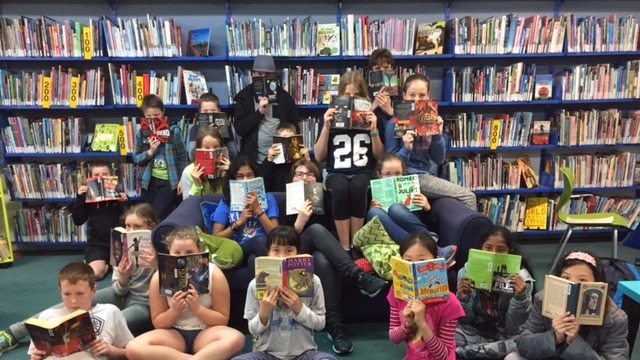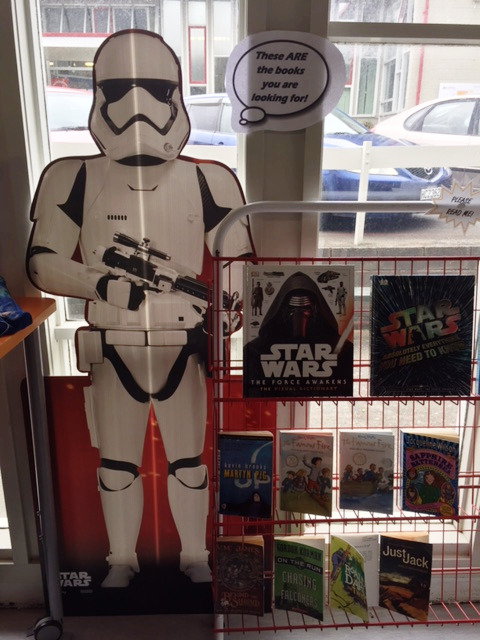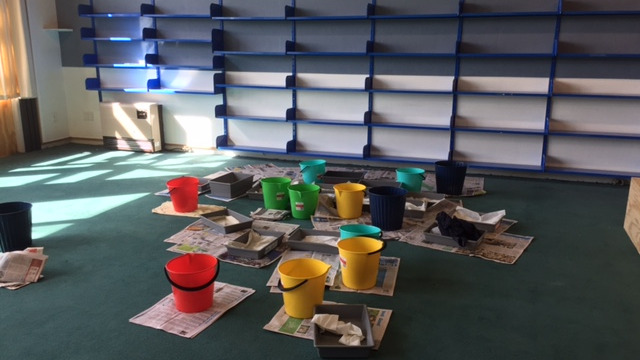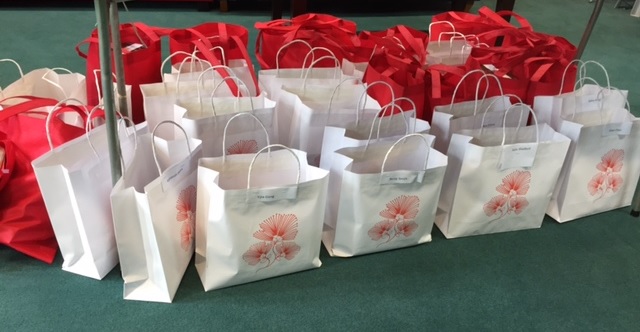New Zealand’s school librarians are passionate, engaged professionals who know how to get students of all ages and reading levels into reading. Clare Forrest works at Raroa Normal Intermediate, and is the sixth librarian featured in this segment.
I have had the pleasure of being one of the librarians at Raroa Normal Intermediate for the last 11 years, starting out as a parent volunteer when my children (now adults) were attending the school, a journey made by many primary school librarians.

Raroa is a high-decile school in Johnsonville, Wellington that has more than 600 Year 7 and 8 students, no uniforms and a long history of great support for its library and library staff. With two librarians supporting students and staff for many years now, including in its ranks, from the 80s the esteemed late children’s literary stalwart Barbara Murison, these hard working and inspiring librarians have laid the foundations of a well resourced and thriving space that has provided stories and succour for preteens for decades.
Helping students to find their reading bliss
As a lover of books and the ability they give us to escape into other worlds and lives, a big part of my job is to help students find that same bliss. It has often been said that a person who doesn’t like reading just hasn’t found the right book yet; a challenge no librarian can resist. With children’s books being the success story for publishers at the moment, we are spoiled for choice with great books of all types for our students; sometimes an overwhelming selection. It is vital that school librarians know their students and are able to gauge when it’s right to pile up an avid readers arms with challenging, exciting, comforting and alarming books or when to dial it right back and find that one non-threatening but cool book for the reluctant unconvinced reader, the one that might just be that “right book”.
It is vital that school librarians know their students and are able to gauge when it’s right to pile up an avid readers arms with challenging, exciting, comforting and alarming books…
It is also essential that we afford our students and staff all sorts of printed and digital material so they can either wallow or carefully select — fiction of all genres, non-fiction (no you can’t just Google everything, sometimes you have to lie on the floor with your friends and turn the pages of the latest Guinness Book of Records together discovering and sharing fun), graphic novels and comics (because they are an excellent way to engage and stimulate reluctant and ESOL readers and there are an increasing number of very good ones out there for kids), picture books (as no-one is too old to be read to) and dyslexic, struggling reader friendly books (for those who need to discover the satisfaction and success of being able to finish and enjoy a story that looks like the ones their peers are reading). Finding and buying and being able to read these is one of the real perks of my job.
It is my belief that all New Zealand schools need to have a school library with a school librarian in them to be able to make all this happen in the best possible way, especially for those children who for whatever reason are not exposed to print material often. If we don’t get them hooked early on, it is harder to do so once adolescence, hormones, the pressures of NCEA expectations, peer pressure and life in general take over. An enjoyment of reading has been well-researched and found to be a strong indicator of engagement in learning, not just of literacy but other subjects as well and in continued success in all aspects of children’s lives.
If we don’t get them hooked early on, it is harder to do so once adolescence, hormones … and life in general take over.
No such thing as a typical day
Working in an intermediate is great fun. Young adolescents are energetic and curious and no two days are alike. We work hard at getting them to self manage their use of the library — they can come in at anytime during the day to choose and issue their own books. We are there to help with recommendations and requests and I love it when students come back to say how much they enjoyed a book and can we please find another one just like it. They can also use the catalogue from home or their class, to reserve books, check their accounts or renew their books.

Classes come in for book talks (it’s still the best way to advertise the new books), to be read a new picture book or to silent read. Often small groups use the library to work on their inquiry, using library or school devices, and this is an ideal opportunity to help with that ever increasingly difficult task of finding just the right information out of the vast array of stuff that is the internet. When the need arises I will run a clinic on whatever is required, either in the library or in a classroom – information literacy and research skills, running an Any Questions session, learning about copyright and Creative Commons or how to use a new digital tool. I try really hard to say “yes” to everything I get asked to be part of and work hard at providing staff with as much support as possible.
I also love everything digital and have for a long time believed that it is an exciting time to be working in school libraries because of the possibilities we have to use digital tools to support our students and staff, often in innovative and cool ways. I have created and maintain our school library website which gives our school community access to much of the library from anywhere with internet access 24/7. Curating and sharing presentations and websites that are specific to our students’ and staff needs is another way for the library to remain relevant and current.

Unfortunately this year due to some strong winds we sustained some damage to our library roof which caused a water feature to develop. Although it is currently being repaired we had to move into a much smaller and not ideal space which has somewhat cramped everyone’s style. As frustrating as this has been, at least we still have a library available and everyone has tried to be as flexible and supportive as possible. With many schools becoming overcrowded it is often the library that is sacrificed when a classroom space is needed or even more alarmingly not planned for at all in new schools or rebuilds with modern learning environments.
Moving out has given us the opportunity to plan the best way to set up when we move back in. We are hoping to involve our students in this process as it the library users and readers we need to focus on. And as much as I love being surrounded by books I think we need to go with quality of and access to books and resources as our priority.
I love bright colours and try to incorporate them as much as possible in our library as I believe it helps make it a stimulating and welcoming place. I want everybody to feel comfortable and happy about being there, even if it’s just to hang out with friends. Pastoral care of students is a hugely important role for a school library, there are always students who need a safe place to be, so after much trial and error and a lot of student consultation our library is now a digital game free zone. It’s not a very quiet library which is just how I like it – busy, buzzy and used.
Pastoral care of students is a hugely important role for a school library, there are always students who need a safe place to be…
Reading promotion
Other than having authors visit us to work with students (there’s nothing like having a hall full of students trying to outwit Brian Falkner or laughing along with Andy Griffith to get them engaged with writers and reading) and running book weeks (arbitrarily whenever we feel like it), one of the best ways we have found to promote reading and how much fun it is, have been our lunchtime Lit Quizzes. Many teams, including a teacher’s one, fill the library with much noise, hilarity and sweets.
I believe there are two keys to our Lit Quizzes’ success; the first, making the questions not too hard and a little bit naughty so everyone, not just the winning teams can enjoy the process. And secondly, having a cool and energetic quiz master (thanks Matt Tilley) who can make even the non-readers want to be in the library because it is such a cool event. Does it get more kids reading? Anytime we have sport-loving, male role models showing how much they value and love reading and books, it has to have an effect on reluctant readers.
Anytime we have sport-loving, male role models showing how much they value and love reading and books, it has to have an effect on reluctant readers.
By far the majority of our staff are readers and this is vital in encouraging our students to do the same. They read aloud to their classes and run many literacy-based programmes that we support. Below are some of the bags we prepared for our Summer Reading programme last year. Our returning students fill in an online form to let us know how many and what type of books they would like to take home for the summer holidays and we choose books for them. There are no limits to how many they can take, which is the same during the year also.

Professional Librarian Organisations
When I began working in the library I joined our professional organisation SLANZA (School Library Association of NZ Aotearoa), mainly because I saw how many amazing school librarians were involved and I knew I could learn a great deal from them. I have recently met up with many members from all over the country at our biannual conference, at King’s College, Auckland this time and it was an exhausting and exhilarating time. The collegiality and support gained from fellow school librarians, at conferences and local sessions, or to have someone at the other end of the phone or email, that understands what you are doing, is invaluable. The way SLANZA uses the skills of its members to provide free professional development is a big part of this and I have learnt so much about the craft of my profession from these opportunities.
Our kids need to see themselves
New Zealand has many wonderful children’s authors, I love having their books in our collection and they are well read by our students. I would also love to have more stories reflecting our Maori and Pasifika students, both fiction and nonfiction. And I wholeheartedly agree with the late John McIntyre, Children’s Bookshop expert, our boys need to see themselves in the books they read. I often have boys asking for books about rugby. They are just as obsessed and knowledgeable about it as much of the population but we have so few novels for them, and by far the majority are from the UK or Australia. I hate seeing them leave the library with nothing, knowing that I have lost a chance to get them hooked.
My ‘books of the moment’
So many books, so many recommendations! One of my favourites this year for students and staff alike is Scythe, by Neal Shusterman, a futuristic look at a world where no-one dies due to advancements in science, technology and politics. Scythes are trained to become ethical and efficient killers to stop overpopulation. A great study of human nature combined with thriller action.
One of my favourites of all time is A Monster Calls by Patrick Ness, a very different book for children than for adults, but the most powerful and beautiful story I have read about dealing with loss. I don’t say this often, as I have a badge that says “Don’t judge a book by it’s movie”, but having just seen the film adaptation that Ness wrote the screenplay for of A Monster Calls, I am just as much in love with what they have created on the screen. A must-see if you are brave enough.
DID YOU LIKE THAT ARTICLE?
Find more of our School Librarians of Aotearoa series here.
Clare Forrest
Clare is the library manager at Raroa Normal Intermediate in Wellington and has been there since 2006. Before learning about the wonders of school libraries she had a number of career incarnations; as a nurse and a science technician. In fact this is the first job she has done for a long time (including parenting) that hasn’t included having to deal with poo but she still loves gory and scientific stories, as well as ones that make her cry.
Favourite things to do other than reading: spending time with family and friends, binge watching TV series, watching sport, knitting, watching sport with family, baking beautiful cupcakes, following Twitter and learning new things.



